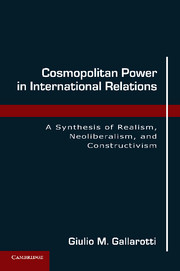 Cosmopolitan Power in International Relations
Cosmopolitan Power in International Relations Book contents
- Frontmatter
- Contents
- Preface
- Introduction
- 1 The Theory of Cosmopolitan Power
- 2 Crucial-Case Textual Analysis of the Founding Fathers of Realism
- 3 Crucial-Case Textual Analysis of the Founding Fathers of Realism
- 4 Case Studies of Soft Empowerment
- 5 Case Study of Hard Disempowerment
- 6 Case Study of Soft Empowerment
- 7 Conclusions
- Appendix Formal Model of Cosmopolitan Power
- References
- Index
7 - Conclusions
Published online by Cambridge University Press: 05 June 2012
- Frontmatter
- Contents
- Preface
- Introduction
- 1 The Theory of Cosmopolitan Power
- 2 Crucial-Case Textual Analysis of the Founding Fathers of Realism
- 3 Crucial-Case Textual Analysis of the Founding Fathers of Realism
- 4 Case Studies of Soft Empowerment
- 5 Case Study of Hard Disempowerment
- 6 Case Study of Soft Empowerment
- 7 Conclusions
- Appendix Formal Model of Cosmopolitan Power
- References
- Index
Summary
Cosmopolitan power offers an alternative to conceptions of power that have traditionally diverged along paradigmatic lines. Realists have embraced the centrality of hard power to the exclusion of soft power. Neoliberals and Constructivists have gone to great pains to reject such strong conceptualizations of world politics in pushing visions that gravitate around elements of soft power. The two conceptions of power are not only far more compatible than the paradigmatic battlefield suggests, but also are necessary components of any process of power management that purports to optimize national influence in world politics. Not only are the paradigms not antithetical with respect to building a theory of such a process, but they actually rely on one another to construct such a theory. Both hard and soft power are necessary elements in the power inventory of nations that seek to attain the greatest possible influence given their resources. The idea of Cosmopolitan power embraces such a vision of power and is founded on principles that suggest points of convergence among the three major paradigms of international relations. Such points of convergence can be developed to forge a new, and more integrated, paradigm of international politics: Cosmopolitik.
Toward a New Paradigm of International Relations: Some Thoughts on a Pre-Theory of Cosmopolitik
The Cosmopolitan theory of power suggests some strong foundations on which to develop a new paradigm in international politics – a paradigm of Cosmopolitan Politics, or Cosmopolitik. The Cosmopolitan theory of power is restricted to one issue area, but success in this issue area is inspiring because paradigmatic cleavages have appeared to be strongest in this particular issue. If some common ground could be forged in one of the most controversial and divisive issues among practitioners of the competing paradigms – that of power – then the prospects for theoretical interfacing on less contentious issues appears promising. The following thoughts suggest some pre-theoretical foundations that might serve to inspire a greater systematic logic that integrates Constructivism, Neoliberalism, and Realism into such a new paradigm. A number of attempts have been made to synthesize elements of these paradigms, and the logic that follows recalls some of the points made in that literature in the context of the logic of Cosmopolitan power.
- Type
- Chapter
- Information
- Cosmopolitan Power in International RelationsA Synthesis of Realism, Neoliberalism, and Constructivism, pp. 266 - 274Publisher: Cambridge University PressPrint publication year: 2010
